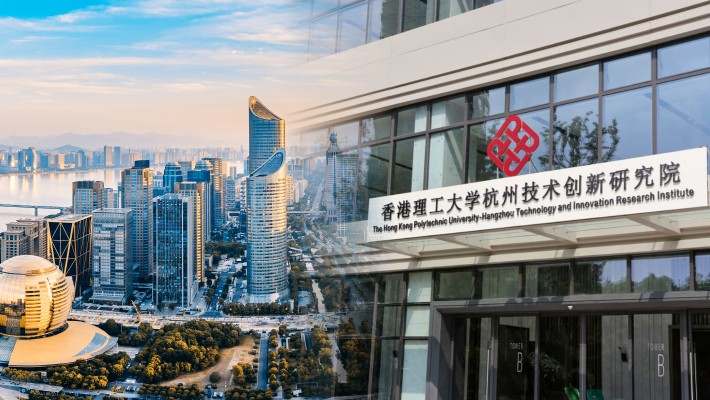Driving smart rail technology forward in Hangzhou
Other Articles
PolyU continues to advance impactful research in various Mainland cities. In Hangzhou, the PolyU-Hangzhou Technology and Innovation Research Institute recently signed collaboration agreements with Hangzhou MTR Corporation Limited (Hangzhou MTR) and Hangzhou Shenhao Technology Co., Ltd (Hangzhou Shenhao Technology). These partnerships aim to jointly develop intelligent operation and maintenance technologies for rail transit and to establish an artificial intelligence (AI) technology laboratory, injecting new momentum into the digital transformation of national railway technologies.
The signing of the agreement between the PolyU-Hangzhou Technology and Innovation Research Institute and Hangzhou MTR was witnessed by (back row) Dr Lam Tai-fai (centre); Prof. Christopher Chao (left); and Mr Ng Wai-hung (right). The agreement was signed by (front row) Prof. Ni Yiqing (left) and Mr Tse Che-ming (right). |
Another agreement with Hangzhou Shenhao Technology was signed on the same day. It was witnessed by (back row) Dr Lam Tai-fai (2nd from left); Prof. Christopher Chao (1st from left); Mr Chen Rushen (2nd from right); and Mr Cao Guangke (1st from right). The agreement was signed by (front row) Prof. Ni Yiqing (left) and Mr Li Tao (right). |
Advancing technological standards with Hangzhou MTR
Since its unveiling in November 2023, the PolyU-Hangzhou Technology and Innovation Research Institute has focused on research and development in Grand Canal culture and tourism, intelligent transportation, and medical aesthetics. The partnership with Hangzhou MTR will accelerate the transformation of research outcomes, enhance corporate innovation capabilities, and elevate the technological standards of rail transit operation and maintenance.
The signing ceremony of the agreement with Hangzhou MTR was witnessed by Dr Lam Tai-fai, PolyU Council Chairman; Professor Christopher Chao, PolyU Vice President (Research and Innovation); and Mr Ng Wai-hung, General Manager of Hangzhou MTR. The agreement was signed by Professor Ni Yi-Qing, Director of the PolyU-Hangzhou Technology and Innovation Research Institute, Director of the National Rail Transit Electrification and Automation Engineering Technology Research Center (Hong Kong Branch), Chair Professor of Smart Structures and Rail Transit of the Department of Civil and Environmental Engineering; and Mr Tse Che-ming, Deputy General Manager of Hangzhou MTR.
Establishing an AI lab with Hangzhou Shenhao Technology
Another agreement with Hangzhou Shenhao Technology, Beijing Shenhao Computer Integration Co., Ltd and Wan Juan Rail Transit Intelligence Technology (Hangzhou) Co., Ltd will establish an AI technology laboratory to advance smart rail transit operation and maintenance, and privatised government deployments, aiming to enhance the competitiveness of domestic technologies.
This agreement was signed by Professor Ni Yiqing and Mr Li Tao, Vice President of Hangzhou Shenhao Technology, under the witness of Dr Lam Tai-fai; Professor Christopher Chao; Mr Chen Rushen, Chairman of Hangzhou Shenhao Technology; and Mr Cao Guangke, Director and CEO.
PolyU representatives visited the partnering companies and conducted in-depth discussions on innovative technologies and future directions in the rail transit sector. The University seeks to integrate its research achievements in rail transit with Hangzhou’s industry ecosystem, transforming them into advanced technologies that support national infrastructure and drive the development of new quality productive forces.








